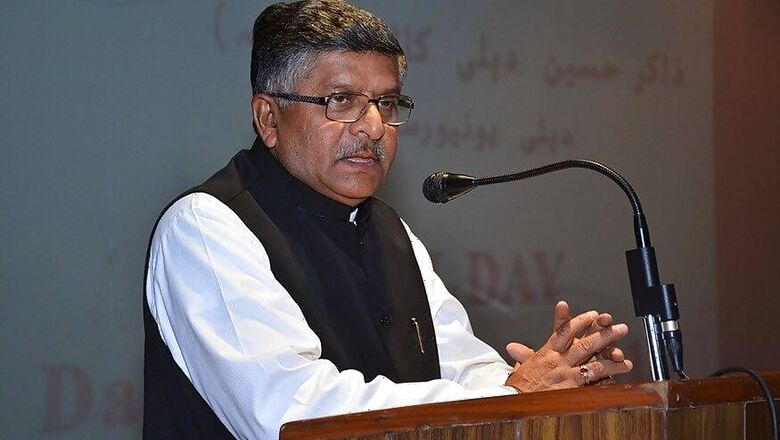
views
New Delhi: When Union Law Minister Ravi Shankar Prasad introduced the Triple Talq Bill in the Lok Sabha last week, he emphasised upon a ruling by the Supreme Court, imploring upon the government to frame a suitable law within six months.
The Law Minister’s tweet that day also gave an impression that the government was acting in tandem with the will of the Supreme Court.
The government of @narendramodi has stood firmly for safeguarding the rights of Muslim women in the triple Talaq matter. #ModiGovtEmpowersWomen pic.twitter.com/mTDQy3Lj9D— Ravi Shankar Prasad (@rsprasad) December 28, 2017
But in doing so, one inalienable piece of truth might have become the casualty.
The Law Minister, speaking in the Rajya Sabha on Wednesday, said that those opposing the proposed law are 'disrespecting the Supreme Court order'.
What is being highlighted repeatedly by the Law Minister and various other leaders from the BJP reflects a view of the Supreme Court, which was overruled by majority of the judges on the Constitution Bench.
On August 22, when the Constitution Bench, comprising five judges, delivered their verdict on validity of instant triple talaq, it was a divided house in the top judiciary too.
Two judges, then Chief Justice of India J S Khehar and Justice S A Nazeer, ruled that triple talaq was an essential religious practice and was hence protected under Article 25 of the Constitution as a fundamental right to practice and profess religion.
“Talaq-e-biddat is integral to the religious denomination of Sunnis belonging to the Hanafi school. The same is a part of their faith, having been followed for more than 1400 years, and as such, has to be accepted as being constituent of their ‘personal law’… We cannot nullify and declare as unacceptable in law, what the Constitution decrees us, not only to protect, but also to enforce But then, these two judges,” held Justices Khehar and Nazeer.
But they still chose to exercise their power under Article 142 of the Constitution for “doing complete justice” in the matter since triple talaq, as they said, smacked of gender discrimination and was arbitrary.
Finally, the two judges concluded: “We therefore hereby direct the Union of India to consider appropriate legislation, particularly with reference to ‘talaq-e-biddat’. Till such time as legislation in the matter is considered, we are satisfied in injuncting Muslim husbands, from pronounncing ‘talaq-e-biddat’ for a period of six months.”
This directive by the two judges is now being cited very often in support of the proposed law but the legal position and a body of judgments by the Supreme Court would make it clear that this order is not binding at all – neither on the government nor on individuals.
The reason being the majority view shared by the three other judges on this Bench had rejected and overruled that triple talaq had to be protected as a fundamental right.
The three judges held that instant triple talaq to be illegal, unconstitutional, impermissible and even un-Islamic.
“What is held to be bad in the Holy Quran cannot be good in Shariat and, in that sense, what is bad in theology is bad in law as well,” said this judge.
Not only this, Justice Joseph clearly discarded the views of Justices Khehar and NAzeer, saying: “I find it extremely difficult to agree with the learned Chief Justice that the practice of triple talaq has to be considered integral to the religious denomination in question and that the same is part of their personal law.”
Citing the contradiction, Justice Joseph also questioned the other two judge as to how they could issue a direction to stop a practice which they held to be a part of religious freedom. “I also have serious doubts as to whether, even under Article 142, the exercise of a fundamental right can be injuncted… it is not for the Courts to direct for any legislation,” he asserted.
Similarly, the two other judges, Justices Rohinton F Nariman and Uday U Lalit, held triple talaq to be violative of Muslim women’s right to equality and manifestly arbitrary. “Though permissible in Hanafi jurisprudence, yet, that very jurisprudence castigates Triple Talaq as being sinful. It is clear, therefore, that triple talaq forms no part of Article 25(1),” the duo held.
These two judges, in fact, framed a question: “When petitions have been filed under Article 32 of the Constitution of India, is it permissible for us to state that we will not decide an alleged breach of a fundamental right, but will send the matter back to the legislature to remedy such a wrong."
And the answer was an emphatic No.
Justices Nariman and Lalit ruled that since triple talaq could not be construed as an essential religious practice, “the submission on behalf of the Muslim Personal Board that the ball must be bounced back to the legislature does not at all arise”.
The two judges then proceeded to declare triple talaq as unconstitutional and further struck down a provision in the 1937 Shariat Act to the extent it sought to recognise and enforce triple talaq as a rule of law in the courts in India.
Therefore, it is as clear as daylight that the three judges rejected the rationale or the need for asking the government to frame a law, in particular since they were invalidating the practice altogether.
Also, it has been held in several judgments by the Supreme Court that the Parliament cannot be directed to bring in a specific law in a particular manner.
It is thus trite to reiterate that the Supreme Court has not directed the government to frame a law on triple talaq and a selective reading of the Court judgment will only lead to confusion and misinformation.

















Comments
0 comment